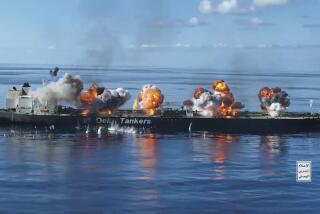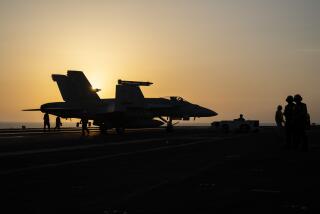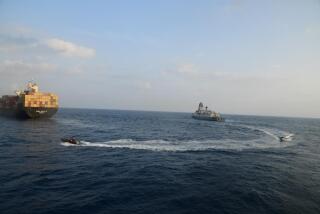More Mines Found in Area of Tanker Blast
- Share via
WASHINGTON — Additional underwater mines have been found in the same area of the Persian Gulf where a Kuwaiti supertanker flying the American flag was damaged by a mine explosion last Friday, Pentagon officials said Tuesday.
“More mines were discovered by one of the navies in the same vicinity” where the U.S.-registered Bridgeton was damaged, said one official who requested anonymity. He and others declined to say how many mines have been found or whether they had been detected by U.S. or Arab patrols.
Officials said that the 401,382-ton Bridgeton, which sustained a 29-foot gash below its waterline, is nevertheless preparing to take on a partial load of crude oil--at least half of its 3-million-barrel capacity--and steam back through the gulf under U.S. naval escort.
A well-connected shipping source told the Associated Press that loading of the Bridgeton probably will start today. Kuwaiti officials have said they expect the Bridgeton and the 46,730-ton Gas Prince, which is traveling with it, to leave Friday for the three-day voyage south.
The Bridgeton, a so-called shuttle tanker, is to transfer its oil to smaller vessels outside the gulf, then head for repairs at Dubai, on the western shore of the gulf.
The Administration maintains that the escort operation is designed to underscore U.S. determination to keeping open international shipping lanes in the gulf. Opponents of the policy cite potential dangers to the expanded U.S. forces in the region.
“The fact that there are threats doesn’t mean we should close the gulf and withdraw,” Pentagon spokesman Robert B. Sims said in a briefing for reporters. “This is a military mission important to our country, and there are risks involved.”
Sims said it is now assumed that the underwater mine that damaged the Bridgeton about 18 miles from the Iranian-held island of Farsi was deliberately planted to strike the first of the 11 reflagged Kuwaiti tankers to pass through the narrow channel and was probably moored to the bottom shortly before the tanker passed.
Information Leaked
He implied that those responsible for the mine obtained advance information about the ship’s course and schedule from news reports based on leaks from officials.
“I’m sure that those ‘invisible hands’ that planted this mine shortly before our tanker arrived at that area had far too much information from various sources about what we were planning to do, when we were planning to do it, where we were planning to do it,” Sims said, adding that “I don’t intend to contribute any more to that kind of information getting out.”
He refused to discuss reports of additional mines that other officials said had been found near Farsi Island, moored to the bottom of the 90-foot-deep channel.
Still No Evidence
Although Iran has said it was pleased that the ship was damaged and has sought to heighten American embarrassment over the incident, U.S. authorities have said that they lack sufficient evidence of Iran’s responsibility to justify retaliation.
The inflammatory rhetoric continued to come from Tehran on Tuesday, according to wire service reports.
The Ayatollah Ruhollah Khomeini, Iran’s revolutionary patriarch, said the United States will suffer more “shame and disgrace” if it continues escorting Kuwaiti tankers through the gulf.
The fundamentalist Shia Muslim leader said that military intervention has drawn the United States into a “big trap and a dangerous game” in the gulf, where Iran and Iraq have been at war for nearly seven years.
Khomeini made his comments in a message to Muslim pilgrims to Mecca. Excerpts were carried by Tehran radio and Iran’s official Islamic Republic News Agency. Muslims from all over the world now are making the annual pilgrimage to the holy city in Saudi Arabia that is the birthplace of Islam.
‘Crush America’s Teeth’
All Islam should “be determined to crush America’s teeth in its mouth,” Khomeini said.
Until the Bridgeton was struck last Friday, no mines had been found near Farsi Island, where Iran has based a number of the attack speedboats it has used to harass shipping in its war with Iraq.
Defense Department officials have cited this lack of precedent in explaining why the U.S. naval contingent assigned to escort the Kuwaiti tankers does not include minesweepers or helicopters equipped for minesweeping.
At the same time, Kuwait and Saudi Arabia, reluctant to be seen as granting the United States military basing rights in the gulf, have declined so far to let American RH-53 minesweeping helicopters operate from their shore facilities. The helicopters are too heavy to land on any of the escort vessels.
Other North Atlantic Treaty Organization countries have turned down U.S. requests for minesweepers, according to U.S. officials, and moving a U.S. minesweeper to the gulf would take a month. The United States has urged Saudi Arabia and Kuwait to expand their mine patrols beyond territorial waters, but U.S. officials have acknowledged privately that the two Arab states’ anti-mine capabilities are limited.
Checking All Options
“We are looking at all the options that might pertain as far as mine countermeasures,” Sims said. “We are working as hard as we can to deal with the mine threat.”
In London, meanwhile, a British seamen’s union that has lost 10 of its members in gulf hostilities called Tuesday for the United Nations to create a “peacekeeping navy” to protect tankers plying the waterway where, it said, merchant sailors feel like “sitting ducks in Exocet Alley.” The Exocet is a French-made missile used by Iraq.
The 23,000-member National Union of Marine, Aviation and Shipping Transport Officers, representing the skippers and other officers of British-registered merchant ships around the world, called on the British government to press for a peacekeeping navy, according to United Press International.
It also demanded sanctions against countries attacking commercial shipping and an international arms embargo against both Iran and Iraq.
A parliamentary committee issued a report Tuesday on the union’s concerns, expressed in hearings, but made no recommendations.
More to Read
Sign up for Essential California
The most important California stories and recommendations in your inbox every morning.
You may occasionally receive promotional content from the Los Angeles Times.










